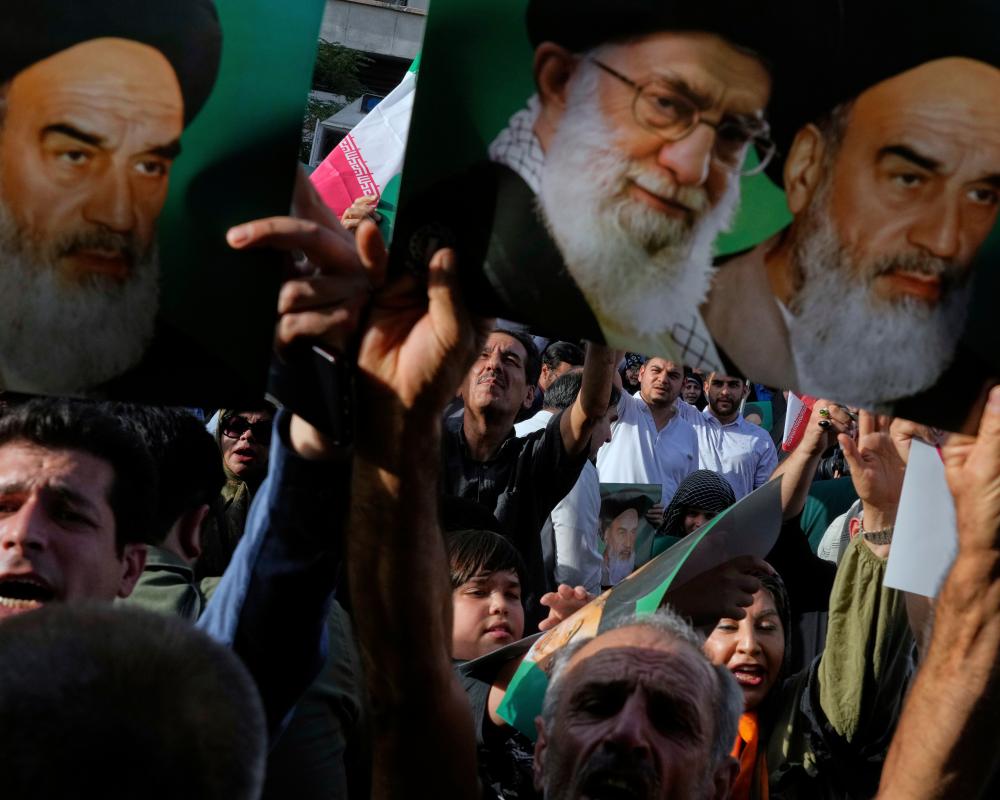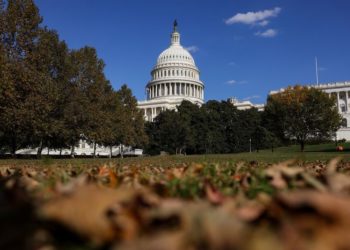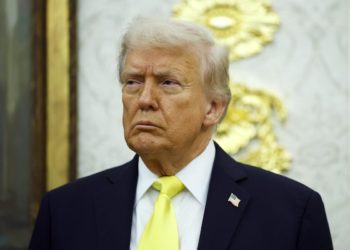Iran has warned the US to brace for retaliation after Donald Trump’s administration joined Israel in its war against Tehran, tearing up his isolationist foreign policy and launching the most consequential intervention in a conflict in a generation.
Almost a day after US strikes targeting three key Iranian nuclear sites, Iran’s president, Masoud Pezeshkian, told France’s Emmanuel Macron: “The Americans must receive a response to their aggression,” signalling a potential Iranian reprisal that could drag the US into a new, protracted conflict in the Middle East.
Trump insisted the airstrikes were a limited intervention, urged Tehran to negotiate an end to its attempts to build a nuclear weapon and warned that striking US troops would lead to a brutal US military campaign.
But after one of the most fateful decisions of his second administration, the question of whether the US will become embroiled in a drawn-out war in the Middle East – something he had promised to avoid – now appears to be in the hands of senior officials in Tehran and the Islamic Revolutionary Guard Corps.
World leaders urged restraint from both sides and a return to diplomacy to prevent the conflict from spiralling out of control. Western governments called for a return to the negotiating table, while China and Russia condemned the strikes and said they undermined global security.
Related: How the carefully planned US bombing of Iran’s nuclear facilities unfolded
Israel continued to strike targets in Iran on Sunday, claiming that about 30 jets flew sorties against dozens of military targets in Iran, including the Imam Hussein strategic missile command centre in the Yazd area, the first against the long-range missile site.
Iranian officials signalled they would consider disrupting maritime trade in the strait of Hormuz or launching strikes against one of dozens of US bases in the region, as its leadership seeks to project strength after an embarrassing series of raids by Israeli and now US warplanes that have operated over the country virtually unopposed.
Senior Pentagon officials said the surprise overnight US attack inflicted major damage and destruction on the nuclear facilities at Fordow, Natanz and Isfahan.
In a press conference in Washington, Gen Dan Caine, the chair of the joint chiefs of staff, detailed Operation Midnight Hammer, in which seven B-2 Spirit bombers flew 18 hours from the US to sites in Iran to drop 14 GBU-57 Massive Ordnance Penetrators.
Caine said it was not clear whether Iran retained some nuclear capability and he stopped short of using the same language as Donald Trump, who said when announcing the strikes on Saturday night that the sites had been “completely and totally obliterated”. The scale of the damage underground was not yet confirmed, Caine said.
Iranian sources were quick to deny that the country’s nuclear programme was devastated, with senior sources telling Reuters that most of the highly enriched uranium at Fordow had been moved elsewhere before the attack. The claim could not immediately corroborated.
Satellite imagery of the attack site from Maxar Technologies showed six fresh craters at the Fordow nuclear enrichment site, probably the entry point for the “bunker buster” bombs meant to penetrate deep into the facility before detonation.
Iran launched about 20 ballistic missiles at Israel on Sunday morning, triggering countrywide air raid sirens and injuring 16 people.
Iran’s supreme leader, Ayatollah Ali Khamenei, said in a recorded statement aired on state television after the strikes: “The Iranian nation is not one to surrender. Americans should know that any military involvement by the US will undoubtedly result in irreparable damage to them.”
Iran’s foreign minister, Abbas Araghchi, said diplomacy was not an option after the US attack and that Iran “reserves all rights to defend its security, its interests and its people”.
He said at a press conference in Istanbul: “My country has been under attack, and we have to respond based on our legitimate right to self-defence. We will do that for as long as needed and necessary.”
Related: Alarm in Middle East over US strikes on Iran amid fears of widening conflict
Araghchi said the US had “blown up diplomacy” that Tehran had been engaged in with Europe and said he would meet Vladimir Putin in Moscow on Monday.
Iran’s parliament on Sunday approved a measure allowing the country’s leadership to close the strait of Hormuz, a crucial shipping route from the Persian Gulf to the Gulf of Oman and Arabian Sea that handles about 26% of the global oil trade.
An Iranian move to block the strait would be “massively escalatory”, said Andrew Borene, a former senior staff officer in counter-terrorism at the US Office of the Director of National Intelligence. “It would disrupt anywhere from 20 to 25% of every barrel of oil in global trade,” said Borene, now executive director of global security at Flashpoint, a threat intelligence firm.
But he argued Iran would probably suffer more than its adversaries from such a move, potentially alienating regional allies who have remained publicly neutral in the Israel-Iran conflict. The closure would more immediately cut off Arab neighbours including Saudi Arabia, the UAE and Kuwait from international markets, he said.
“I think it ends up being worse for the Iranians than for anyone else,” Borene said. “You’re going to cut off your Arab neighbours from their ability to export … I have to think that runs the risk that you have now converted Arab neutrals into Arab Iranian adversaries.”
While the final decision rests with the country’s leadership and not its pliant legislature, the parliament’s move indicated an Iranian threat to disrupt global energy shipping.
It was unclear whether an Iranian response would include its network of proxies across the Middle East, including militias such as Hezbollah in Lebanon and the Houthis in Yemen. On Saturday, the Houthi spokesperson Yahya Saree pledged to attack US ships and warships in the Red Sea if the US intervened in Iran, despite a May ceasefire between the US and the Yemeni militia.
US officials said they were sending signals to Iran to encourage it to negotiate rather than launch a retaliation that could escalate into a protracted war.
Pete Hegseth, the defence secretary, denied that the US was pursuing a policy of regime change in Iran. “This mission was not and has not been about regime change,” he said. “Anything can happen in conflict. We acknowledge that. But the scope of this was intentionally limited. That’s the message that we’re sending. ”
The US vice-president, JD Vance, who has been an outspoken opponent of US military interventions, said during an interview on MSNBC that the US was “not at war with Iran, we’re at war with Iran’s nuclear programme”.
Speaking from the White House on Saturday night, Trump said: “Our objective was the destruction of Iran’s nuclear enrichment capacity and a stop to the nuclear threat posed by the world’s number one state sponsor of terror. Tonight, I can report to the world that the strikes were a spectacular military success. Iran’s key nuclear enrichment facilities have been completely and totally obliterated.
Related: The Guardian view on Trump bombing Iran: an illegal and reckless act | Editorial
“There will be either peace or there will be tragedy for Iran far greater than we have witnessed over the last eight days. Remember, there are many targets left. Tonight’s was the most difficult of them all by far, and perhaps the most lethal. But if peace does not come quickly, we will go after those other targets with precision, speed and skill.”
The Israeli prime minister, Benjamin Netanyahu, hailed the strikes. “Congratulations, President Trump, your bold decision to target Iran’s nuclear facilities with the awesome and righteous might of the United States will change history,” he said in a video statement.
Trump said he and Netanyahu had “worked as a team like perhaps no team has ever worked before, and we’ve gone a long way to erasing this horrible threat to Israel”.
After Iran’s barrage of missiles, Israeli warplanes began strikes in western Iran, hitting missile launchers and Iranian soldiers, the Israeli military said.
In Iran, the media played down the US strikes, with the state-run IRNA news agency acknowledging early on Sunday an attack on the Fordow nuclear site but saying it had been evacuated beforehand. The semi-official Fars news agency, which is close to the Revolutionary Guards, quoted another official saying air defences opened fire near Isfahan and explosions had been heard.
Later, Iran’s atomic agency said the country would carry on with its nuclear activities despite the US attacks on key facilities. Mohammad Manan Raisi, a member of the Iranian member representing the city of Qom, where Fordow is located, said the damage to the nuclear facility was not major and “only on the ground, which can be restored”.
The International Atomic Energy Agency said there had been “no increase in off-site radiation levels” after the attacks on the three nuclear sites.
Israel has been launching strikes on Iran for two weeks. It has sought to systematically eradicate the country’s air defences and offensive missile capabilities and damage its nuclear enrichment facilities.
US and Israeli officials said 13,500kg (30,000lb) bunker buster bombs that US stealth bombers alone can carry offered the best chance of destroying heavily fortified sites connected to the Iranian nuclear programme buried deep underground at Fordow.
The post Iran says US ‘must receive a response’ after Trump’s strikes on nuclear sites appeared first on The Guardian.




